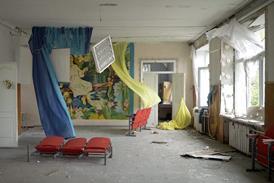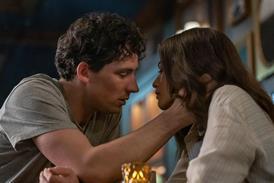Dir: Cedric Kahn. France. 2001. 124 mins.
An immensely detailed study of a notorious mass murderer and his hunters, Roberto Succo is an impressive but subdued piece of work which, despite an extraordinary central performance, never delivers on the director's promise to slip the audience inside the mind of a madman. A play about the case by Bernard-Marie Koltes was picketed by police in France who regarded it as romanticising a cop killer. By no stretch of the imagination could the film version of his story - based, rather, on a book about Succo by the journalist Pascale Froment - be accused of glorifying or explaining its protagonist; in fact, if anything, it errs in the opposite direction.
With an even more undefined character as the police officer leading the French investigation, the film lacks a figure who would carry the audience through the narrative, and the result remains cold and, in the end, uninvolving. Roberto Succo should command attention from those fascinated by the lurid real-life case on which it is based; on the other hand, the squeamish will be deterred by its subject, although there's little onscreen bloodshed, and Kahn's approach is detached and unsensational. While his reputation and probable festival kudos should give the film an initial boost, reviews will be divided and in the long term, it represents a tough commercial sell outside France and Italy, Succo's two stamping grounds.
The story begins in 1981 with the police arriving at a horrific murder scene just outside Venice, Italy, where a 19-year-old man, Roberto Succo, has brutally stabbed his parents. Cut to five years later: Succo (Cassetti) is now at large in the South of France, passing under a false name and claiming variously to be an English sales rep or a secret agent. Here he meets 16-year-old Lea (Le Besco) and, although even this naive girl is sceptical of his crazy yarns, they start up a tentative holiday romance.
After the summer is over, Succo moves to the Annecy region, where Lea lives with her parents, and they resume their relationship although she has increasing doubts about his volatile behaviour. At one point he actually confesses that he had killed his parents after his mother refused to let him use their car, and has spent five years in an Italian mental institution. Infatuated with the handsome, weirdly charismatic young man, and uncertain whether this is just another of his wild fabrications, she fails to turn him in, but later ends the affair.
Meanwhile, Succo launches himself into an energetic and lengthy crime spree: auto theft, kidnapping, burglary and multiple killings, including a police officer. Although his acts are unpremeditated and he makes only the most perfunctory attempts to conceal his identity, the French investigation led by Thomas (known only by his first name) lags consistently several steps behind him.
Succo escapes over the Swiss border, where he abducts a female schoolteacher, and becomes the object of a chase involving dozens of cars and officers but yet again makes his escape. However the net closes in after Lea sees his photo on a police poster: her evidence helps Thomas identity his target as Succo and to enlist the help of Interpol in tracking him down to Mestre where he is finally arrested by the Italian police.
The film alternates between two perspectives. One strand follows the attempts of the French police to find the killer and, after he's arrested, to bring him to justice despite being hobbled by bureaucracy and the machinations of Succo's Italian lawyer. These scenes record police procedure with documentary precision, dwelling on forensic evidence and still photographs of the victims and crime scenes.
The second, and dominant narrative strand tracks Succo as he cuts a swathe through three countries. The character is established as irrational and regressive, yet with a streak of crazy charm which allows him to attract a stream of gullible young women.
There's also an unsettling, almost comical chemistry between him and his female abductees. One encounter with a medical student ends with Succo's kissing her on the cheeks and wishing her good luck in her exam, while the schoolteacher he kidnaps in Switzerland is able to control and survive the encounter, remarking that she's used to working with children. The film's trump card here is the raw energy and ravaged good looks of Cassetti, a young Italian non-professional in his acting debut, who burns up the screen in every scene he's in.
Dell'Isola, by contrast, barely registers as the buttoned-down detective leading the French investigation. Perhaps because he's based on a composite of real officers rather than a single individual, we learn little about him, other than the cliched detail that his marriage is in trouble. What's more damaging is the absence of vivid moments in the film which would bring this character to life.
When Thomas finally gets to meet Succo face-to-face before an Italian judge, who must decide whether to extradite the criminal, the scene is a real let-down. There's no sense that this is the grand confrontation towards which the whole film has been building, while Succo's speech "justifying" his behaviour with a mad rant involving Marxism and paranormal omens, adds nothing to our insight into his psyche.
In technical terms, this is undoubtedly a superior achievement, with sparing but effective use of music and sound effects and CinemaScope photography showing Succo sometimes roving free through the vast mountain and coastal landscapes, sometimes framed and contained within doorways and cramped interiors.
The individual scenes are economically staged and, on their own terms, extremely compelling. But, perhaps because of the director's concern to adhere to the minutiae of the case, the film fails as a whole to sweep the audience up in its dramatic momentum.
Prod cos Agat, CIE.
Co-prods Diaphana, Ex Nihilo, France 3, Gimages, Vega.
French dist Diaphana.
Int'l sales Mercure.
Prods Gilles Sandoz, Patrick Sobelman.
Scr Kahn, based on the book by Pascale Froment.
Cinematography Pascal Marti.
Prod des Francois Abelanet.
Ed Yann Dedet.
Music Julien Civange. Main
Main cast Stefano Cassetti, Islid Le Besco, Patrick Dell'Isola, Vincent Deneriaz, Aymeric Chauffert, Estelle Perron.


















No comments yet